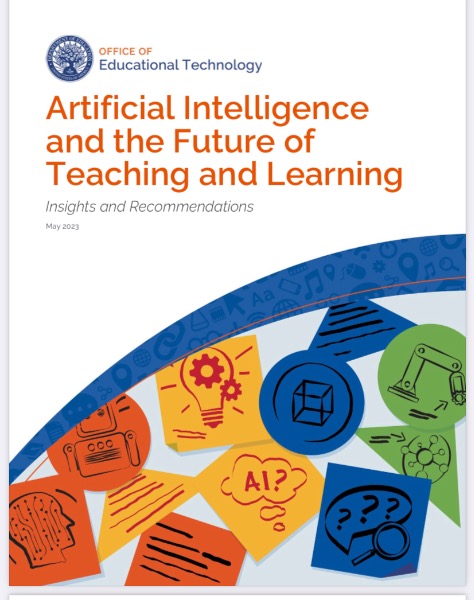Report: AI and the Future of Teaching and learning
I see articles and posts about artificial intelligence every day. I have written here about it a lot in the past year. You cannot escape the topic of AI even if you are not involved in education, technology or computer science. It is simply part of the culture and the media today. I see articles about how AI is being used to translate ancient texts at a speed and accuracy that is simply not possible with humans. I also see articles about companies now creating AI software for warfare. The former is a definite plus, but the latter is a good example of why there is so much fear about AI - justifiably so, I believe.
Many educators seem to have had the initial reaction to the generative chatbots that became accessible to the public late last year and were being used by students to write essays and research papers. This spread through K-12 and into colleges and even into academic papers being written by faculty.
A chatbot powered by reams of data from the internet has passed exams at a U.S. law school after writing essays on topics ranging from constitutional law to taxation and torts. Jonathan Choi, a professor at Minnesota University Law School, gave ChatGPT the same test faced by students, consisting of 95 multiple-choice questions and 12 essay questions. In a white paper titled "ChatGPT goes to law school," he and his coauthors reported that the bot scored a C+ overall.
ChatGPT, from the U.S. company OpenAI, got most of the initial attention in the early part of 2023. They received a massive injection of cash from Microsoft. In the second half of this year, we have seen many other AI chatbot players, including Microsoft and Google who incorporated it into their search engines. OpenAI predicted in 2022 that AI will lead to the "greatest tech transformation ever." I don't know if that will prove to be true, but it certainly isn't unreasonable from the view of 2023.
Chatbots use artificial intelligence to generate streams of text from simple or more elaborate prompts. They don't "copy" text from the Internet (so "plagiarism" is hard to claim) but create based on the data they have been given. The results have been so good that educators have warned it could lead to widespread cheating and even signal the end of traditional classroom teaching methods.
Lately, I see more sober articles about the use of AI and more articles about teachers including lessons on the ethical use of AI by students, and on how they are using chatbots to help create their teaching materials. I knew teachers in K-20 who attended faculty workshops this past summer to try to figure out what to do in the fall.
 The U.S. Department of Education recently issued a report on its perspective on AI in education. It includes a warning of sorts: Don’t let your imagination run wild. “We especially call upon leaders to avoid romancing the magic of AI or only focusing on promising applications or outcomes, but instead to interrogate with a critical eye how AI-enabled systems and tools function in the educational environment,” the report says.
The U.S. Department of Education recently issued a report on its perspective on AI in education. It includes a warning of sorts: Don’t let your imagination run wild. “We especially call upon leaders to avoid romancing the magic of AI or only focusing on promising applications or outcomes, but instead to interrogate with a critical eye how AI-enabled systems and tools function in the educational environment,” the report says.
Some of the ideas are unsurprising. For example, it stresses that humans should be placed “firmly at the center” of AI-enabled edtech. That's also not surprising since an earlier White House “blueprint for AI,” said the same thing. And an approach to pedagogy that has been suggested for several decades - personalized learning - might be well served by AI. Artificial assistants might be able to automate tasks, giving teachers time for interacting with students. AI can give instant feedback to students "tutor-style."
The report's optimism appears in the idea that AI can help teachers rather than diminish their roles and provide support. Still, where AI will be in education in the next year or next decade is unknown.
Trackbacks
Trackback specific URI for this entryThe author does not allow comments to this entry
Comments
No comments